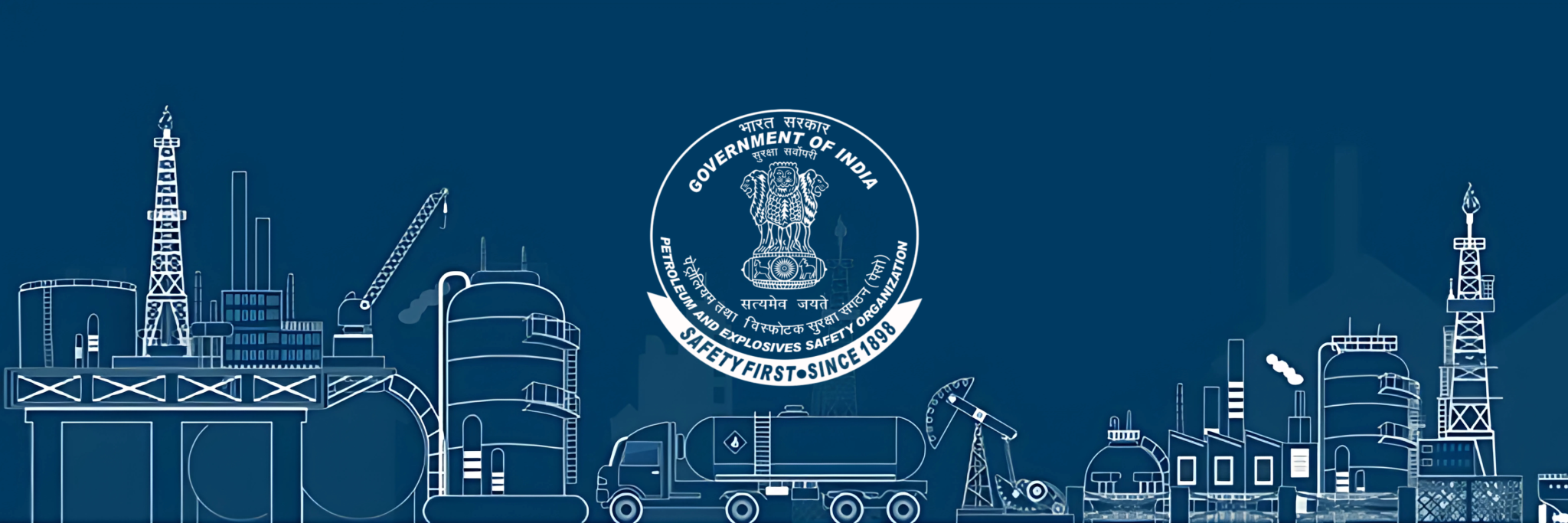Service
PESO Certification
Introduction to PESO Certification
The Petroleum and Explosives Safety Organization (PESO) is a regulatory authority in India that ensures the safety of hazardous materials, particularly those related to petroleum, explosives, compressed gases, and other dangerous substances. Initially established as the Department of Explosives in 1898 under British India, the organization’s mission was to prevent accidents and disasters arising from hazardous materials. Since its inception, PESO has grown to oversee a vast range of safety measures related to the manufacturing, storage, transportation, handling, and disposal of dangerous substances.
PESO’s main focus is on ensuring that products used in hazardous environments meet strict safety guidelines and that those working with such products have the necessary training and certifications to do so safely. The organization is responsible for overseeing the safety requirements for not only petroleum products but also compressed gases, explosives, pressure vessels, and gas cylinders. It plays a vital role in ensuring the safety of operations within the oil and gas, chemical, and petrochemical industries.
Over more than a century, PESO has become a highly respected regulatory authority in India, providing certifications and oversight for the safety of critical infrastructure and products.

What is PESO Certification?
PESO certification is the official approval granted by the Petroleum and Explosives Safety Organization for products used in the handling, transport, and storage of hazardous materials. The certification ensures that such products meet the necessary safety standards and comply with India’s stringent safety regulations. The PESO certification process applies to equipment and products involved in industries where there is a risk of explosion, fire, or other hazardous conditions.
PESO Certification applies to:
- Explosives
- Petroleum products
- Compressed gases
- Pressure vessels (static and mobile)
- Gas cylinders
- Electrical equipment used in hazardous environments (flameproof electrical fittings, etc.)
- Cross-country pipelines
- Liquefied Natural Gas (LNG), Compressed Natural Gas (CNG), Auto LPG, Compressed Biogas (CBG)
The PESO certification process is based on the Explosives Act, 1884, and the Petroleum Act, 1934, along with related rules and regulations such as the Explosives Rules, 2008 and the Petroleum Rules, 2002. These laws outline the safety standards required for various industries, especially those dealing with hazardous materials.
Key Stakeholders and Licenses for PESO Certification
Various businesses and industries are subject to PESO certification requirements. The following stakeholders are commonly involved in obtaining PESO certification:
- Petroleum/Gas Cylinders/SMPV(U): Manufacturers and suppliers of petroleum products, compressed gas cylinders, and Static and Mobile Pressure Vessels (SMPV).
- Explosives and Ammonium Nitrate: Companies dealing with explosives, ammonium nitrate, and similar hazardous substances.
- Gas Cylinder Testing Stations: Facilities that test gas cylinders for integrity and safety.
- Fabrication Shops: Shops involved in fabricating pressure vessels or related equipment.
- SMPV (Unfired): Manufacturers of pressure vessels that store gases or liquids under high pressure.
PESO Certification Process
Obtaining PESO certification involves a comprehensive process to ensure that products meet safety standards and regulations. The process includes the following stages:
1. Documentation Preparation:
- ATEX/IECEx Certificate
- Test Reports
- Business Licenses
- Sales Data
2. Application Submission:
- The manufacturer or importer submits the application to PESO, providing all necessary documents and commercial data.
- Authorized Indian Representative (AIR): The applicant must have an AIR based in India. This representative is responsible for communicating with PESO authorities and ensuring compliance with the certification process.
3. Scrutiny and Review:
- PESO officials will review the submitted documents to ensure they meet the required standards.
- Factory Audits: For certain products, such as pressure vessels, PESO may require a factory audit to ensure the manufacturing process meets safety regulations.
4. Issuance of PESO Certification:
- If all requirements are met, PESO will issue the certification for the product, confirming its compliance with safety standards.
Documents Required for PESO Certification
To successfully obtain PESO certification, the following documents are required:
- Application Form: The completed application form that outlines the product and its intended use.
- ATEX/IECEx Certificates: These international certificates verify that the equipment has been tested and approved for use in explosive or hazardous environments.
- Test Reports: Safety test reports that are generally no more than two years old.
- Product Technical Drawings: Detailed engineering drawings of the product.
- Business Licenses: Licensing documents for the manufacturing facility, Authorized Indian Representative (AIR), and the business.
- ISO Certificates: If applicable, ISO certification for the manufacturing process.
Change Management in PESO Certification
Once a product has been PESO certified, any changes to the product’s design, components, or manufacturing process must be reported to PESO. Some changes may require additional approvals, and the manufacturer must submit an official application for any modifications that could affect the safety of the product.
Changes that may require PESO approval include:
- Design modifications
- Changes in core components or materials
- Updates to ATEX/IECEx certificates
- Any alterations that could impact the product’s compliance with safety standards
Why Choose ERA Global
Standards Certification?
At ERA, we simplify the PESO certification process by offering:
Expert Guidance
Document Preparation
Testing Coordination
Compliance Assurance
Ready to start your certification journey?
Let us help you navigate regulatory challenges and achieve certification with ease. Leave us your details and we will get back to you or you can request a free consultation.

